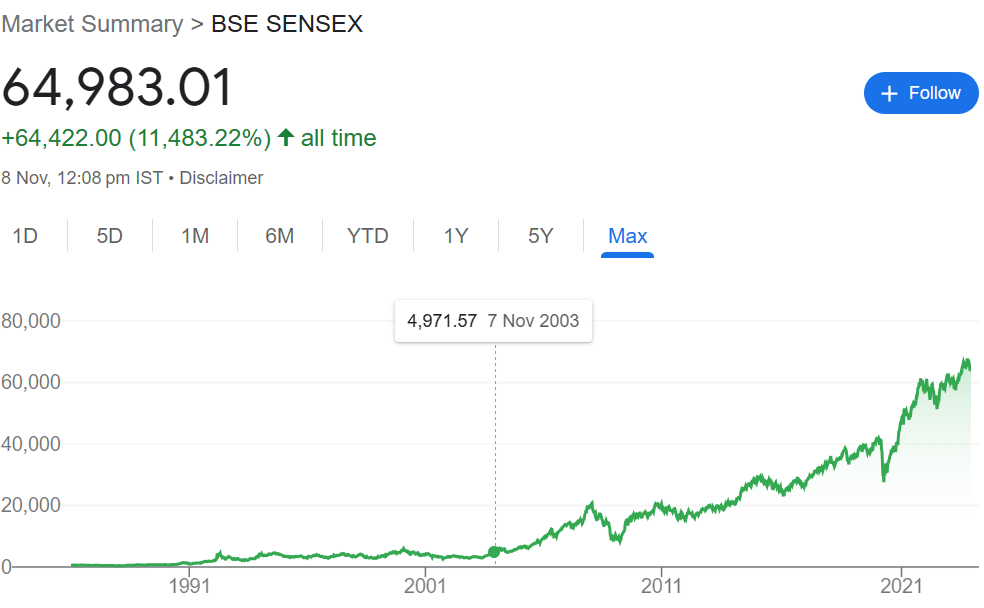The year of 2020 was a roller coaster ride for stock markets around the world. Markets were at the top in Jan’2020, when the news of the COVID 19 started to come and soon in the March’20, it was declared a pandemic.
The economic sentiment went low, when lockdown introduced all across the globe and stock markets also nosedived drastically by approximately 40%.
Most of the investors were panicked and started withdrawing money from stocks markets, ETFs and mutual funds.
However, there were some of the investors, who without wasting time and over thinking about the best stocks and plans, started investing Mutual funds as the markets going further down.
Read: Top 10 Traits of a Successful Investor
Nevertheless, those investors invested their money in tranches in Best Mutual Funds to Invest for few months with lot of force. Now, after about a year of panic in the stock market, they are handsomely rewarded with 70% to over 100% profits in many cases, even more than the so-called experts of equity markets.

We are going to understand more about Best Mutual Funds to Invest here, and will also suggest some of the best mutual funds to invest in 2024.
What is Mutual Fund?
Before investing anywhere, we should understand what it is, its risk factors and nature of functioning, also, will it be suited to our investment objectives and risk profiles.
Mutual fund is pool of funds contributed by investors, for a common objective of capital gain or profit from the avenues, such as, stock market, Bonds, Government securities and money market.

Mutual funds are run by Asset management Companies (AMCs), who hire best of the qualified and experienced professional from the investment world, to manage and invest your money in above mentioned investment avenues by charging a fee.
The main objective of these Fund managers is to beat the underlined Index, for instance, BSE Sensex, Nifty 50, Nifty Bank, Nifty top200 and others.
The point is, that these full-time fund managers invest your money in best quality stocks and fixed assets, and make profits for you more than the plan vanilla Index, those extra gains made are called Alpha.
These fund managers perform fundamental, quality analysis and technical analysis, of the securities they invest on your behalf and regularly track those companies’ financial health and growth. This are called actively managed fund which are best mutual funds to Invest in.
On the other hand, there are other passively managed investment funds, where you can invest via. ETFs and Index funds, which hardly require a fund manager but match the stocks of the indexes, mentioned above, but does not mandated to beat the index in terms of returns.
Type of Mutual Funds
There are several types of mutual funds, and distributed into different categories, depending upon the risk factor and targeted assets to invest in. Some of the most popular of those are mentioned below: –
Equity Mutual Funds:
| Types of Equity Mutual Funds | How they Invest |
| Large Cap Funds | Mainly invest in top 30 or 50 Large companies according to market capitalization |
| Mid Cap funds | Mainly Invest in Mid-sized companies, from 50th to 250th accordingly to market cap. |
| Small Cap funds | Mainly Invest in Smaller sized companies, beyond top 250 companies accordingly to their market cap. |
| Multicap funds. | Invests in all the above-mentioned type of companies with equal limits. |
| Flexi Cap Funds | Invests in all the categories of companies and make changes according to market situations and economy. |
| Hybrid Funds | This has a mandate of investing maximum of 60% in equities, rest in Fixed income assets. These are also called as balanced funds. |
| Asset allocation funds | Here, investments are allocated to different asset classes, like, stocks, bonds, Gold and others. |
| Sectoral Funds | Invests in a particular sector companies, such as, Finance, Technology, FMCG, Infrastructure and others. |
| ELSS | Equity linked saving schemes are the tax saving mutual funds, perform similar to Large cap Funds but have the lock in period. |
Debt Mutual Funds
Then, there are best mutual funds to Invest, which mainly invests in Government Bonds, government securities, corporate bonds, bank deposits to get risk free fixed returns for the investors and called as Debt Funds, some of those are mentioned below: –
- Long Term Funds
- Medium Term Debt Funds
- Short Term Bonds
- Liquid Debt funds
Point to note here is that above mentioned debt funds are also face risks and do not promise for a fixed return like, Bank Fixed deposits but relatively having lesser risk and moderate returns.
Best Mutual Funds to Invest in 2024
Even if we have several categories of mutual funds, we have to invest in a particular best mutual funds to Invest of a scheme of an AMC, So, it multiplies into long list of mutual funds schemes. But for you readers, here are best Mutual Funds to Invest in 2024 in the main categories: –
| S.No. | Category | Selected Schemes |
| 1 | Equity Large cap Funds | 1. Nippon India Large cap fund |
| 2 | 2. Quant Focused Fund | |
| 3 | Equity Mid cap Funds | 1. Axis Mid cap Fund. |
| 4 | 2. Quant Mid cap Fund. | |
| 5 | Equity Small cap Funds | 1. Kotak Small Cap fund |
| 6 | 2. SBI Small Cap fund | |
| 7 | Equity Flexi cap Fund | 1. Nippon India Focused Equity |
| 8 | 2. HDFC Focused 30 Fund | |
| 9 | Equity Tax Saving Fund | 1. Bandhan Tax Advantage (ELSS) Fund |
| 10 | 2. Quant Tax saving fund | |
| 11 | Bonus: Equity Funds | 1. SBI Banking & Financial Services Fund |
| 12 | 2. Mirae Asset Emerging Bluechip | |
| 13 | 3. Motilal Oswal NASDAQ 100 | |
| 14 | Index Funds | 1. HDFC Sensex ETF |
| 15 | 2. Nippon India ETF NV20 | |
| 16 | Debt Funds: | 1. ICICI Pru Debt Management (FOF) |
| 17 | 2. SBI Magnum Income Fund | |
| 18 | 3. Nippon Low duration Fund | |
| 19 | 4. HDFC Banking and PSU Debt fund |
How to select best mutual funds to Invest of Equity Mutual Funds from above list:
- It is not mandatory to select all the best mutual funds to Invest from above schemes or distribute your savings, that will lead to over-diversification, short list according to time duration and risk appetite towards the stock market fluctuations.
- You may select one from each category mentioned above, as 4-5 best mutual funds to Invest schemes, are enough for long term financial goals and enough diversification across companies at large.
- Most importantly, it is advisable to go for equity schemes, only, if you want to invest for 5 years of more, else, you may invest in debt funds as mentioned in next list.
- It is advisable to invest through SIPs (systematic investment plan), to benefit from fall in the market and invest at lower prices to gain more in future.
Best Debt Mutual Funds to invest in India:
| S.No. | Selected Schemes |
| 1 | 1.ICICI Pru Debt Management (FOF) |
| 2 | 2. SBI Magnum Income Fund |
| 3 | 3. Nippon Low duration Fund |
| 4 | 4. HDFC Banking and PSU Debt fund |
How to select best mutual funds to Invest from above list of Debt or mutual funds
- Debt funds are generally chosen to invest for short to medium term financial goals, for stable and low risk returns.
- You may distribute your money savings in above mentioned debt funds for at least two of those according to the duration you chose.
- There are few risks in debt funds also, for instance, interest rate risk and credit risk. Wherein, due to changes in interest rate by central bank, the returns may vary, also, there always a risk of capital, if the borrower does not pay back to mutual funds, as per the agreed time period.
- Investors can expect better than inflation and fixed deposit returns in the debt funds, with little bit more risks; moreover, these funds are tax efficient, if retained for more than 3 years period for long term capital gains.
Why you should Invest in Best Mutual Funds in 2024?
The main objective of investing in equity best mutual funds to invest is to get maximum returns over a long period of time, typically, 5 years or more, due to reason that in the shorter term, the stock markets get volatile and may show losses also but in longer term the funds shows upward trend.
Investors should be prepared for short term fluctuations in the stock markets, which may result due to factors like, war, pandemic, financial crises and many more such reasons, but stay put.
Also read: Why you should invest in stock market?
Nevertheless, in the long run, equity has given the best returns in India of around 14% annually, more than any other asset classes, such as, gold, real estate, bonds, fixed deposits, insurance and others.
BSE Sensex, India, has returned 13.42% overall annually in the last 3 decades

Advantages of Best Mutual Funds to Invest in 2024
1. Professionally managed investment by Experts:
Your investments in mutual funds are managed by well qualified and expert professionals. They analyse the stocks and other securities in detail, before investing your hard-earned money. They generally work in a group of investment professionals for gazing 360 degree economic view and micro details of the corporate they are about to invest.
It takes lots of time and effort of the expert fund managers, which is difficult for you and me to devote, and got deep knowledge of investment classes to invest, for instance, understanding of industrial cycles to invest at the right time and withdraw from it.
2. Automatic Investment Diversification:
Mutual funds have inherent feature of diversification across asset classes and different companies to invest in. Fund managers starts with identifying the best performing sectors of the industry which will grow in the future then, there are best companies stocks are chosen, across the sectors of an economy to diversify your investments.
Moreover, if there are some stocks not performing as per expectations, those are sold and invested in better themes to grow your money even more.
3. Allows to start Small:
Mutual funds allows all the investors to start investing from a small amount, it is generally mere Rs. 500 with which you start investing in India’s biggest companies. If want to invest directly in the stocks of these blue chip companies, you may not be able get the piece of top companies, as most of the prices of stocks of these companies are onwards of minimum price mentioned above.
For instance, by paying just Rs.500 you can invest in all the companies and diversify your investment, on the other hand, if you want invest in stock, you may end up getting single or small units of a stock of one company only.
Key here is to invest regularly, even with little amount of money, to build your wealth in long period of time to get power of compounding.
4. Flexible process of investing:
Mutual funds provide a flexible approach towards investing in stocks, bonds and government securities. You can give standing instruction to your mutual fund distributor to invest a particular amount every month, week or even a quarter, and the process will be automatically investing in mutual funds without fail.
Additionally, you opt for systematic investment plan, systematic withdrawal plan, systematic transfer plan to transfer to other mutual schemes, to automate your investment and withdraw your money when you require.
These days, mutual fund companies are providing options to invest for your particular financial goals and guide you to achieve those successfully by suggesting best suitable mutual funds schemes.
5. Provides liquidity:
Best mutual funds to invest provide facility to withdraw your investments any point of time when you require, except, tax saving schemes (there is lock in period of 3 years).
You can liquidate your mutual funds, whenever, you are having requirement of your money and after redeeming your mutual funds units, the money is deposited to your bank automatically in 2-3 days.
6. Investor friendly Regulations and transparency:
Mutual fund process is regulated by SEBI in India, where they provide various regulations under which mutual funds companies has to act and make sure there are no wrong doings, with the investments of all the investors. They closely monitor the mutual funds activities and have empowerment to correct the course, any time they think fit.
Moreover, mutual funds schemes have to declare the portfolio each month as per regulation, so that, you can monitor where your money is invested by the mutual fund managers in the portfolio of the particular schemes on various websites.
Also, there are list of stocks in which fund managers can invest, with prescribed limit in a particular stock and invest according to the objective of the mutual fund scheme, this is another safety feature of mutual funds.
Some Disadvantages of Mutual Funds
1. Difficult to beat the stock market index consistently:
Stock market is a dynamic place, where, different stocks, themes, sectors are affected due to sudden changes in economic environment. Resulting, some stocks or bonds securities may not give returns as expected by fund managers.
For instance, we have witnessed live example in the year 2020, wherein, most of the Large Cap mutual funds schemes were not able to beat the Nifty 50 or BSE Sensex Index. So, it is advisable that if you are not actively analysing your mutual funds performances at least once in a 6 months, you may take a help of the mutual fund advisors and remain ahead of curve.
2. Possibility of over diversification:
There can be a situation where, same stocks are being invested in your different mutual fund schemes, also, some of the good stocks might be avoided by fund managers due to less availability in the market, and mutual funds mostly buy stocks in high volumes.
In other words, mutual funds invest in 40-50 companies even more in some cases, to diversify risk in different stocks and sectors, while, you might needed only best 25 companies to invest in, else, you can invest in Index funds, if you want to cover the whole Index.
However, no such limitations are there in direct investing and Portfolio Management Services (PMS), where, you can customize as per your preferences and invest in stocks which actually you like to invest.
3. Little higher costs of investing:
As the mutual funds are managed by investment professionals, they charge a certain fee in each scheme you invest in. That is where Index and Exchange traded Funds come into picture.
The benefit that Index funds and ETFs bring is the lower cost of investing and saves money in the long period of time and might even defeat actively managed mutual funds, as we saw in year 2020 in case of large cap funds.
Nevertheless, mutual funds provide an easy option for small investors to grow their money with the support of experts in investment world and create best chances for each one of us to build wealth in the long period of time.
Conclusion:
Mutual Funds bring significant rewards for new and small investors ride on the economic growth in any of the country. Investing regularly and patiently holding mutual funds units, fetch compounding affect to your investments. I have experienced this by investing mutual funds regularly, in the last 10 years.
On top of it, well qualified and experienced fund managers, who have seen ups and downs, opportunities and threats to the invested money, are most aware of the current situation and act swiftly to improve the returns in best mutual funds scheme.
Most importantly, mutual fund industry is heavily regulated by SEBI and Government in the interest of the investors. Even the mutual fund advisors are regulated by SEBI to provide suitable investment advice to investors. In fact, now, mutual fund distributor’s income is correlated with the investors returns, more the returns for investors, better the rewards for MF advisors/distributors.
Disclaimer: Do consult with your financial advisor for all your financial decisions. This content is written for purpose of education and not a direct advice to anyone.